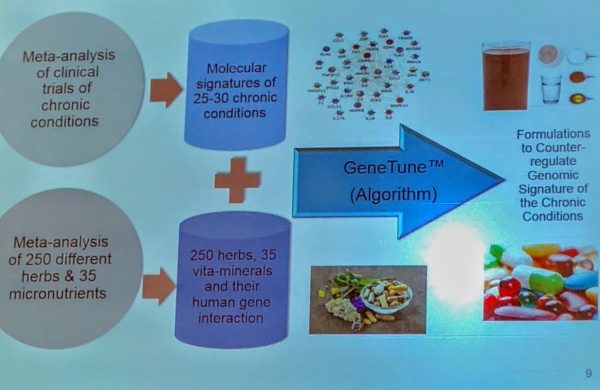September 21, 2018 Harvard Medical School, Boston, Massachusetts James E. Griffin Ed.D.

Many of you know I am constantly scanning the horizon to determine where food (in general) and the culinary profession (more specifically) is headed. This quest has brought me to Harvard Medical School today and the 24th annual conference of the Functional Foods Institute. After two days of seminars and reflection it is clear to me that the impact and use of functional foods is going to expand, joining other major forces that are reshaping our food system. This message isn’t new but it’s becoming amplified. The movement toward foods that are sustainable and sourced with integrity will be complimented by demand for foods that are also functional. A functional food is defined as “natural or processed foods that contain biologically active compounds; which, in defined, effective and non-toxic amounts, provide a clinically proven and documented health benefit utilizing specific biomarkers for the prevention, management, or treatment of chronic disease or its symptoms[i].” Highly technical research is underway to validate the “functionality” of a wide number of foods which serve as ingredients used daily in food manufacturing and commercial kitchens throughout the U.S. and the world. In the future we (chefs) will have extensive scientifically validated (clinical) data about the myriad ingredients we work with. During the conference multiple researchers shared the advanced science behind and impact of functional foods on health and wellness. Three of my favorites are summarized below.
Early on day one Dr. Uma Naidoo, Director of Nutritional and Lifestyle Psychiatry at Massachusetts General Hospital and Instructor of Psychiatry at Harvard Medical School presented. Dr. Naidoo is also a trained chef and serves as a culinary instructor at Cambridge School of Culinary Arts. Her research focuses on nutritional psychiatry and five key target areas: the immune system, oxidative stress, brain plasticity, epigenetic modifications, and the microbiome-gut-brain axis. She was quoted recently in a fascinating Wall Street Journal story on foods that target depression and anxiety. The story featured Chef Jessica Largey and her struggle with anxiety and depression and quotes Dr. Naidoo. Largey, a former Chef de Cuisine at Manresa restaurant in Los Gatos, CA., found recovery by modifying her diet for optimal brain health following principles shared by Dr. Naidoo during her presentation. She is back on track and recently opened the widely acclaimed Simone in Los Angeles. Chef Largey’s story is a case study. Brain health requires effort and evidence is mounting that certain dietary compounds including long-chain omega 3 fatty acids (EPA & DHA) offer significant health benefits. However, few chefs are aware of the literature. We need to spend time understanding this research for our own benefit and the benefit of our customers. Imagine a future when Chefs manage the psychological and physical intensity of the profession through a healthy diet and lifestyle. Imagine a day when such practice is incorporated in to menu planning. Many will benefit. It’s worth the effort.
Above, I am pictured with Dr. Leena Pradhan-Nabzdyk (right), CEO of Canomiks (and assistant professor of surgery at Harvard Medical School), and Dr. Ruud Albers (center) CEO of NutriLeads in the Netherlands. The photo was taken after Pradhan-Nabzdyk’s presentation on her brilliant research. Canomiks, of Cambridge, MA., has identified the relationship of 250+ herbs and 35 micronutrients with 20000+ human genes using a proprietary technology called “Gene Tune®.” This technology enables efficacy in targeting specific chronic conditions with herbs and supplements or simply provides increased  effectiveness of general purpose and wellness supplements and functional foods. Her work is mind-blowing from a culinary perspective. Imagine a future where the herbs and ingredients we use are chosen because of their scientifically proven efficacy in promoting health in addition to their sensory properties and supply chain integrity. Her work will add a new dimension to how we think about food and ingredients. Those who ignore this work will be left behind.
effectiveness of general purpose and wellness supplements and functional foods. Her work is mind-blowing from a culinary perspective. Imagine a future where the herbs and ingredients we use are chosen because of their scientifically proven efficacy in promoting health in addition to their sensory properties and supply chain integrity. Her work will add a new dimension to how we think about food and ingredients. Those who ignore this work will be left behind.
Image © Canomics
On day two we heard from Dr. Albers, formerly an executive with Unilever. NutriLeads is a health ingredients company identifying and developing crop-derived products with a clinically proven positive impact on human health. They are engaged in research focused on foods that boost immune function and microbiota using ingredients chefs work with on a regular basis (carrots at present). The company moves each ingredient through its system from analysis and product development to clinical trials in an effort to scientifically demonstrate efficacy. How many suppliers do you know that are taking this approach? As the demand for functional foods that have been validated increases the supply chain will evolve. Albers is way ahead of the curve and will be one of the first to provide the profession with clean, natural, validated, functional ingredients.
Over the past two days cutting-edge information was shared including 30 presentations across eight categories or themes. I leave this conference with a perspective on the future of ingredients and the competencies food professionals and chefs must have to keep pace with these major developments. Professionals will be required to know and understand the definition for “functional foods” and how clinically functional the ingredients they use are (or aren’t). Smart chef’s will stay ahead of the curve and build functional food competency now in preparation for future product development and menu planning not to mention personal health and wellbeing per chef Largey. Congratulations to Dr. Danik Martirosyan of the Functional Foods Institute for assembling an excellent and diverse conference program.
[i] http://www.functionalfoodscenter.net/